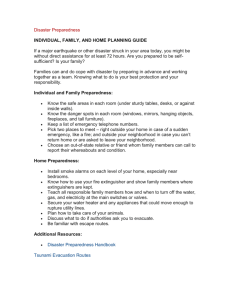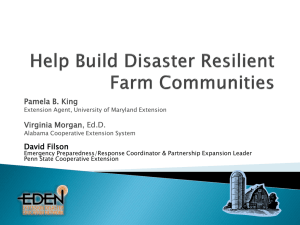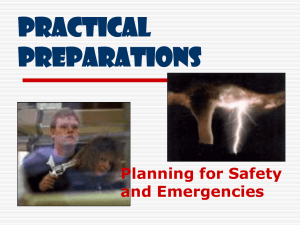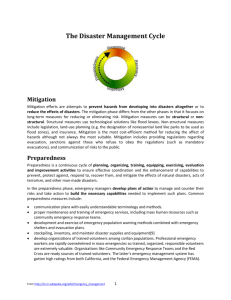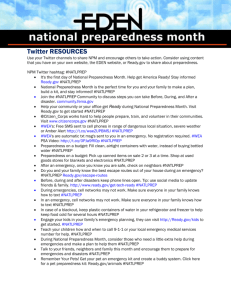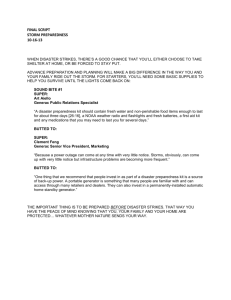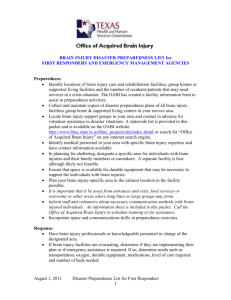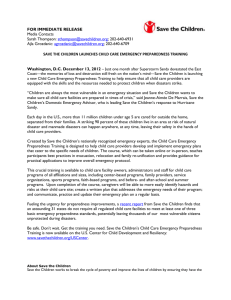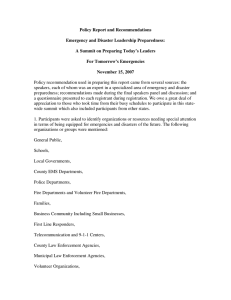Lea Emergency and Disaster Summit Sponsors:
advertisement
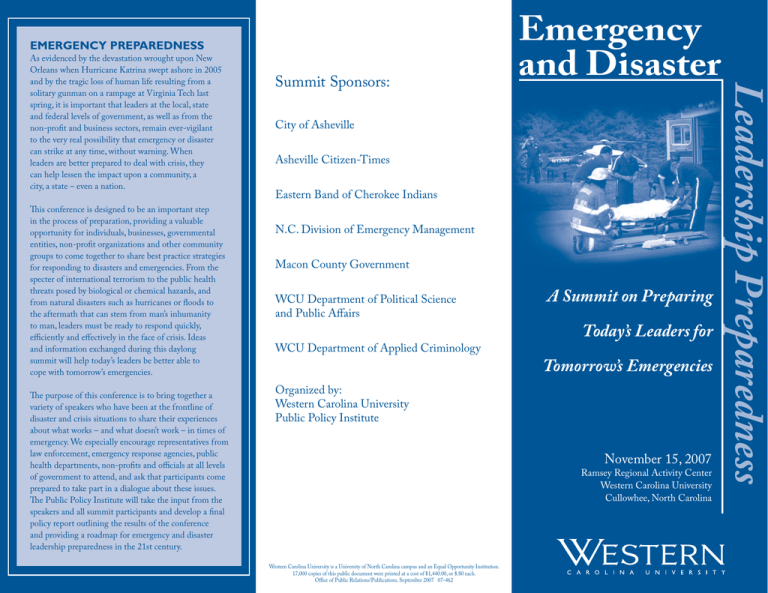
EMERGENCY PREPAREDNESS This conference is designed to be an important step in the process of preparation, providing a valuable opportunity for individuals, businesses, governmental entities, non-profit organizations and other community groups to come together to share best practice strategies for responding to disasters and emergencies. From the specter of international terrorism to the public health threats posed by biological or chemical hazards, and from natural disasters such as hurricanes or floods to the aftermath that can stem from man’s inhumanity to man, leaders must be ready to respond quickly, efficiently and effectively in the face of crisis. Ideas and information exchanged during this daylong summit will help today’s leaders be better able to cope with tomorrow’s emergencies. The purpose of this conference is to bring together a variety of speakers who have been at the frontline of disaster and crisis situations to share their experiences about what works – and what doesn’t work – in times of emergency. We especially encourage representatives from law enforcement, emergency response agencies, public health departments, non-profits and officials at all levels of government to attend, and ask that participants come prepared to take part in a dialogue about these issues. The Public Policy Institute will take the input from the speakers and all summit participants and develop a final policy report outlining the results of the conference and providing a roadmap for emergency and disaster leadership preparedness in the 21st century. Summit Sponsors: City of Asheville Asheville Citizen-Times Eastern Band of Cherokee Indians N.C. Division of Emergency Management Macon County Government WCU Department of Political Science and Public Affairs WCU Department of Applied Criminology Organized by: Western Carolina University Public Policy Institute Leadership Preparedness As evidenced by the devastation wrought upon New Orleans when Hurricane Katrina swept ashore in 2005 and by the tragic loss of human life resulting from a solitary gunman on a rampage at Virginia Tech last spring, it is important that leaders at the local, state and federal levels of government, as well as from the non-profit and business sectors, remain ever-vigilant to the very real possibility that emergency or disaster can strike at any time, without warning. When leaders are better prepared to deal with crisis, they can help lessen the impact upon a community, a city, a state – even a nation. Emergency and Disaster A Summit on Preparing Today’s Leaders for Tomorrow’s Emergencies November 15, 2007 Ramsey Regional Activity Center Western Carolina University Cullowhee, North Carolina Western Carolina University is a University of North Carolina campus and an Equal Opportunity Institution. 17,000 copies of this public document were printed at a cost of $1,440.00, or $.80 each. Office of Public Relations/Publications. September 2007 07-462 Summit: Emergency and Disaster Leadership Preparedness in the 21st Century Program Schedule 7:30-8:30 a.m. Registration and Visitation to Display Tables 8:30-8:45 a.m. Welcome Dr. John W. Bardo, Chancellor Western Carolina University 8:45-9:50 a.m. Panel I: Emergency and Disaster Leadership Preparedness and Response Panel Chair: Dr. Gordon Mercer, director WCU Public Policy Institute Applying Lessons Learned in Emergencies and Disasters: Hurricanes Floyd, Ivan and Katrina Bioterrorism and All Hazards Preparedness: A Public Health Perspective Jerry VeHaun, director, Buncombe County Department of Emergency Services Dr. Martha Salyers, M.D., Medical director Buncombe County Health Center The Importance of Effective Emergency-Disaster Orientation and Training of Elected and Appointed Officials: Katrina and Virginia Tech as Examples Robert Berry, CEM, associate professor, Department of Applied Criminology, Western Carolina University 9:50-10:50 a.m. Panel II: Emergency and Disaster Leadership Preparedness and Response Establishing a Command Center and Crisis and Communications System in Disasters and Emergencies Local Leaders Preparing and Educating Citizens for Emergencies and Disasters N.C. National Guard Capabilities and Deployment in Emergencies and Disasters: Force Packages Panel Chair: Dr. Michael Duvall, Director of Economic Development, Eastern Band of Cherokee Indians Gregory Grayson, Chief of the Fire and Rescue Department, City of Asheville Debra Collington, Director of Emergency Services American Red Cross Lt. Col. Jamie Mosteller, Director of Military Operations and Military Support, N.C. National Guard 10:50-11:05 a.m. Break 11:05 a.m.-12:20 p.m. Panel III: Emergency and Disaster Leadership Preparedness and Response International Terrorism: FBI Response and Assessment First Responder Preparedness in Western North Carolina: A Preliminary Analysis Public Health Preparedness: What It Is and Who Does It? Panel Chair: Dr. C. Don Livingston, professor Department of Political Science and Public Affairs, Western Carolina University James D. Russell, Supervisory Senior Resident Agent, Federal Bureau of Investigation and previously Supervisor, National Joint Terrorism Task Force Unit at the National Counterterrorism Center, Washington, D.C. A registration fee of $25 covers the luncheon, conference, refreshments and materials. Governmental agencies, non-profits and other organizations working in the emergency and disaster preparedness areas are encouraged to set up booths. Tables for displays are available at no cost, but are limited in number. Please make checks payable to: WCU Public Policy Institute. Dr. Lisa Briggs, assistant professor, and Dr. Karen Mason, assistant professor Department of Applied Criminology, Western Carolina University Dr. Julie Casani, M.D., Preparedness director N.C. Division of Public Health 12:30-1:55 p.m. Luncheon and Keynote Addresses Vision for the Future in Emergency and Disaster Preparedness National Preparedness in Emergencies and Disasters: The Challenge Ahead H. Douglas Hoell, Jr., director N.C. Division of Emergency Management, Department of Crime Control and Public Safety Corey Gruber, assistant deputy administrator, National Preparedness Directorate of the Federal Emergency Management Agency and former Executive Director of the National Preparedness Task Force for the U.S. Department of Homeland Security 1:55-2:30 p.m. Final Speakers Panel Ideas for Solutions, and Questions for Speakers and Panel Specialists This panel provides an opportunity for conference participants to offer their own ideas as well as to ask questions of speakers who have shared their insights during the summit. 2:30-3:00 p.m. Visitation to Display Tables For additional information, contact Ronnie Hewitt or other PPI staff.
